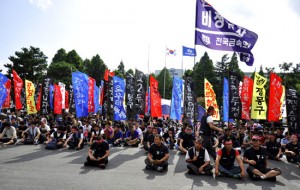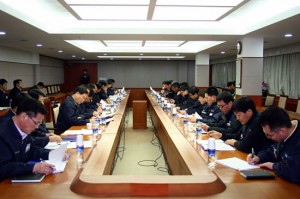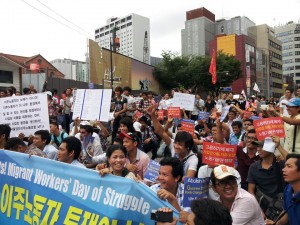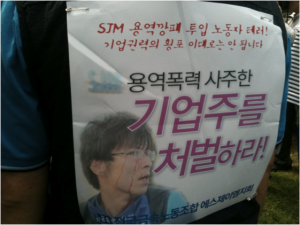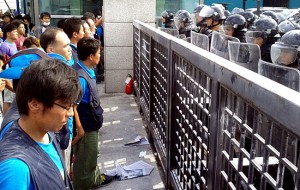The Struggle against Privatization must go on
Posted in articles on January 5th, 2013 by pssp – Be the first to commentDecember 8 Protest against Privatization
"Stop privatization!" "Strengthen quality public services!"
These were the slogans chanted by some 3000 thousand workers who braved the snow and cold weather to gather at Seoul Plaza last December 8 in protest against President Lee Myung-bak's end-of-term dive to privatize public services. Sang Moo Lee, President of the Korean Public & Social Services and Transportation Workers' Union .KPTU), captured the thought of the crowd aptly when he stated, "More than this cold weather, it is the biting wind of privatization wrecking havoc in the lives of common people that makes us shiver," in his opening speech.
A Global Trend
Public sector privatization, promoted by international economic institutions like IMF and World Bank, has become a global trend over the last thirty years. Since the advent of the global financial crisis this trend has accelerated with government use claims about the need for austerity to justify the sale of public corporations and outsourcing of public services. As was recently recognized at the 29th Congress of the global union federation Public Services International (PSI), however, "privatization. . . (is) often used to drive down wages and conditions of workers and generate profit for the private sector" and, by raising costs and limiting access, is depriving "millions of people#46; #46; #46; of their fundamental human rights" (PSI, Programme of Action, 16, 31).
South Korea's Anti-Privatization Struggle
South Korea is no exception to the global trend. Over the past several years, successive administrations have sought to privatize utilities, rail transport and other public services. They have, however, met determined resistance from South Korean labor unions, many of whom are members of PSI. Most notably, in 2002 a joint strike by the Korean Power Plant Industry Union, the Korean Railway Workers' Union and the Korean Gas Corporation Union succeeded in stopping the Kim Daejung administration's plans for direct privatization in these areas. For many years afterwards, the government was unable to pursue blatant sale of public corporations, although it did pursue privatization through roundabout means, such as allowing the entry of private companies into utility provision and the contracting of local public services to private companies.
With the advent of the Lee Myung-bak administration, however, privatization got a second wind. Under his policy of 'the advancement of public enterprises', Lee sought to facilitate the entry of private corporations into gas distribution and expand privately owned power plants, calling these changes the 'introduction of competition to eradicate irrationality' in public corporation management.
End-of-Term Privatization Drive
With his term coming to an end, Lee has sped up privatization efforts even further. Last February, the right to operate Cheongju International Airport for the next 30 years was contracted to a partially U.S.-owned holding company for the bargain price of 25.5 billion won .roughly 15 million USD). The Lee administration has also been pursuing sale of shares of the Incheon International Airport Corporation and recently announced plans to sale Incheon Airport's duty free shops to private capital. Recently, it also announced removal of legal and structural barriers to make way for private operation of the KTX rapid transit train from Suseo to Busan. The construction of the rapid-transit rail line and the private railway operator's use of the government-owned tracks would be subsidizing with taxpayers' money. In as much as private companies are sure to put money-making above security and public access, airport and rail privatization has been heavily criticized as sacrificing safe and user-friendly transport for capitalist profits. Workers and community members have also been fighting the administration's plans to allow for-profit hospitals and the contracting of water provision to private companies fearing the reduction of access to quality and affordable healthcare and clean drinking water.
Prospects under Park Geun-hye
The protest on December 8 was organized by several coalitions of labor unions, social movement organizations and community groups, which have been formed to fight privatization on all fronts. Unfortunately, the work of these groups is far from over, especially considering the recent election of the conservative Park Geun-hye as South Korea's next president. While Park shied away from the subject during her election campaign due to negative public opinion, her past statements have indicated her support for privatization, and numerous news outlets have predicted that pro-privatization forces in the administration will gain confidence from her victory. Moreover, clauses in the U.S.-Korea FTA, pushed through the National Assembly last year, which allow foreign investors to sue the government for 'anti-competition' policies, will make privatization irreversible once it is achieved.
The anti-privatization struggle will have to get several notches stronger in 2013. To make this possible, unions and other anti-privatization forces must begin putting forth concrete alternatives to privatization that make the provision of quality public services financially and structurally viable. They must also remember the power they wielded in 2002 when public sector unions in three industries went on strike together, and seek to connect knit their struggles in to a global anti-privatization movement. Only with unity and determination will the labor movement be able to defeat privatization and defend the people's right to quality public services during the next 5 years of conservative rule.
